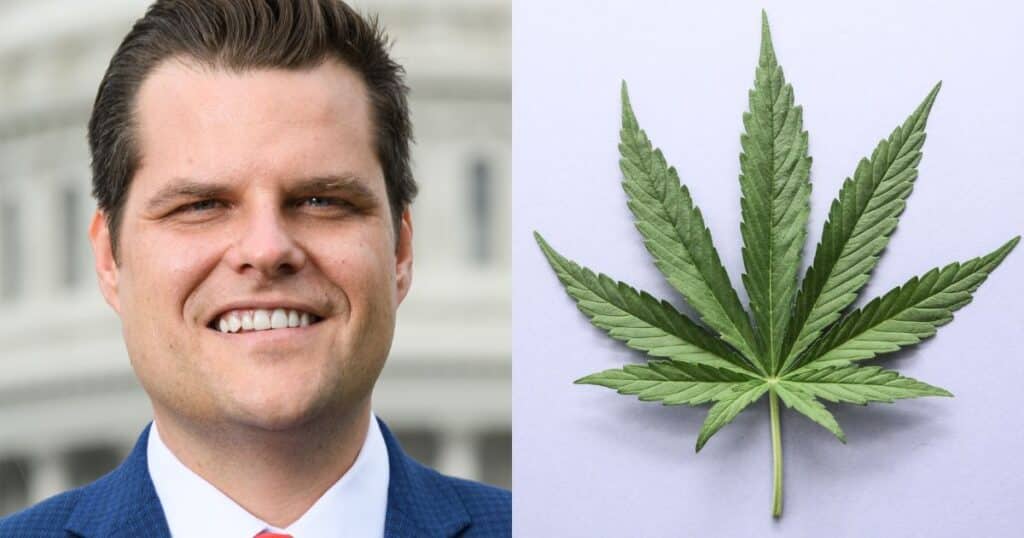Matt Gaetz, initially considered for the role of Attorney General in President-elect Trump’s cabinet, has decided to withdraw from consideration as of November 21, 2024.
In an unexpected political move, President-elect Donald Trump has nominated Florida Representative Matt Gaetz to serve as the next U.S. Attorney General. This announcement has surprised many in political circles and the cannabis industry, prompting discussions on what Gaetz’s appointment could mean for federal marijuana policy. With his pro-cannabis stance and history of supporting marijuana reform, Gaetz could be a pivotal figure in reshaping America’s approach to cannabis legislation.
— Donald J. Trump (@realDonaldTrump) November 13, 2024
Matt Gaetz an Unlikely Ally for Cannabis Reform?
Matt Gaetz’s nomination as Attorney General is notable not only due to his political career but also because of his strong support for cannabis reform. Known as one of the most marijuana-friendly Republicans in Congress, Gaetz has consistently advocated for progressive marijuana policies.
During his time in the U.S. House of Representatives, he was 1 of 5 Republicans who voted in favor of the Marijuana Opportunity Reinvestment and Expungement (MORE) Act, a bill aimed at federally legalizing marijuana by descheduling cannabis from the Controlled Substances Act and implementing various criminal and social justice reforms, such as expunging prior convictions.
Gaetz’s track record extends beyond mere legislative support. He has actively participated in discussions regarding marijuana descheduling, raising concerns about the lack of clear timelines for reviewing cannabis’ federal classification. His appointment as Attorney General could bring a much-needed shift in federal marijuana policy.
If confirmed, Gaetz’s role as Attorney General could signify a significant shift in how the Department of Justice approaches cannabis-related issues. Unlike former Attorney General Jeff Sessions under Trump’s first term as President, who opposed cannabis reform, Gaetz has expressed a willingness to “go easy on marijuana.” This potential change in attitude from the nation’s top law enforcement official could provide a boost to the cannabis industry.
Gaetz has also shown support for the SAFE Banking Act, which aims to protect financial institutions working with state-legal cannabis businesses and would enable legal cannabis businesses to take advantage of 280E, highlighting his commitment to removing barriers for the industry.
Additionally, his advocacy for descheduling marijuana from a Schedule I drug could mark a turning point in federal cannabis policy, reducing its classification from a high-risk substance to one with very low risk.
Trump’s Stance on Cannabis Rescheduling and Implications for State Markets
Adding another layer to the unfolding narrative of cannabis reform in the United States, President-elect Donald Trump has signaled an openness toward continuing the rescheduling process of cannabis under the Controlled Substances Act (CSA).
This stance marks a departure from the rigid policies seen during his first term, offering hope to advocates seeking to reshape national cannabis policy. Trump has previously indicated support for reconsidering cannabis’s federal classification, aligning with public sentiment that views current laws as outdated.
In an illustration of his evolving views on cannabis, Trump also voiced support for Florida Amendment 3, which aimed to allow recreational use for adults 21 and up in Florida but ultimately failed. This position actually contrasts with Gaetz, who opposed the amendment.
However, Gaetz’s nomination as Attorney General is seen as a strategic move to maintain momentum in cannabis legislation reform nationwide. By appointing Gaetz, Trump appears to be ensuring that cannabis policy reform remains a priority, potentially paving the way for substantial change under his administration.
Also, Gaetz’s appointment could provide reassurance to state markets that have already embraced cannabis legalization. His history of advocating for state-level reforms, which have been a common theme in the Trump administration, such as expanding medical marijuana access in Florida in 2019, suggests a federal approach that respects state rights. This aligns with the previous DOJ policy of non-interference with state medical cannabis programs, which Gaetz seems likely to continue.
Controversies of Matt Gaetz’s Nomination and Challenges Ahead
Despite Gaetz’s pro-cannabis reputation, his nomination is not without controversy. Allegations and investigations surrounding his political career, which he has adamantly denied, raise questions about his potential confirmation by the Senate. These controversies could affect his ability to influence cannabis policy if his nomination is not confirmed.
The nomination of Matt Gaetz as Attorney General seems to signal President-elect Donald Trump’s effort to address cannabis reform during his administration. By appointing a vocal cannabis advocate, Trump is reinforcing his campaign promises regarding marijuana policy changes. Gaetz’s potential leadership within the DOJ could expedite initiatives like the SAFE Banking Act and marijuana rescheduling, aligning with the industry’s long-standing goals.
Gaetz’s potential influence as Attorney General could transform the federal landscape for cannabis. Industry stakeholders are optimistic about the opportunities his appointment presents, including increased access to banking, revised scheduling, and continued state-level autonomy. However, achieving these goals will require navigating political hurdles and addressing controversies that could impact Gaetz’s ability to enact meaningful change for the national cannabis industry.
















